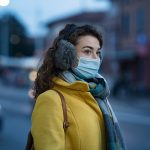Health WARNING: Prolonged use of a face mask has 4 NEGATIVE health effects
 (NaturalHealth365) Let’s be frank about something that the mainstream media doesn’t like to admit: while some people believe that wearing a face mask may help slow the spread of viral illnesses like COVID-19, it doesn’t come without a cost. In fact, there is plenty of evidence revealing the negative health effects of prolonged use of face coverings, from N95s to cloth masks.
(NaturalHealth365) Let’s be frank about something that the mainstream media doesn’t like to admit: while some people believe that wearing a face mask may help slow the spread of viral illnesses like COVID-19, it doesn’t come without a cost. In fact, there is plenty of evidence revealing the negative health effects of prolonged use of face coverings, from N95s to cloth masks.
So, whether you’re choosing to wear a mask or forced to wear one due to a local or state mask mandate, keep reading to discover how you can avoid “maskne” and other unintended health consequences.
Your face mask could be causing oral health problems plus 3 other issues, scientists say
If you’ve ever gone several hours wearing a face mask, you may notice that your mouth feels unpleasantly dry. Unfortunately, wearing a mask can exacerbate dry mouth by promoting mouth-breathing and reducing humidity in the air you inhale.
And it turns out a dry mouth isn’t just uncomfortable and foul-smelling. According to the National Institute of Dental and Craniofascial Research, persistent dry mouth increases the risk of tooth decay and oral infections, including an infection with Candida albicans, the bacteria responsible for oral thrush. Masks can trap bacteria inside your mouth, where they can overgrow and irritate your delicate oral tissues.
Wearing your face mask day-in and day-out could also be leading to these other issues, according to experts:
- Skin irritation. “Maskne” is a trending topic for a reason! Known clinically as acne mechanica, maskne happens as a result of prolonged use of face coverings, which trap bacteria and debris against your skin, clog your pores, and lead to inflammation and breakouts. Skin irritation caused by face coverings are made even worse if you wash cloth masks with harsh chemicals.
- Carbon dioxide build-up in the body. According to the American Lung Association (ALA), prolonged use of certain face coverings like N95s may lead to a build-up in carbon dioxide levels in people with pre-existing lung diseases, which, by the ALA’s own count, is as many as 37 million Americans. Excessive amounts of carbon dioxide in the body, known as hypercapnea, can cause symptoms including headaches, dizziness, and shortness of breath. While you may not experience this issue from your mask, anyone with respiratory illnesses should be speaking to their doctors about what kind of face mask practice is right for them – if any at all.
- Increased risk of respiratory illness. A 2015 randomized controlled trial published in BMJ Open revealed that the use of cloth masks, at least in the healthcare setting, may increase the risk of respiratory infections due to a combination of “moisture retention, reuse of cloth masks and poor filtration.” As a disturbing side note: many ancillary staff members in hospitals are being instructed to wear their own cloth masks at work in order to “preserve” personal protective equpiment for clinical staff.
Ultimately, while some officials may suggest that wearing a mask reduces the risk of respiratory illnesses, it’s important to consider that the evidence on this is weak, at best. In fact, when you dig a little deeper into the research (for the past 10 years) – wearing a mask does little to prevent the spread of COVID-19. Not to mention all the very real threats that increase our risk of getting sick.
Hopefully, this information will motivate you to optimize your overall health through no-nonsense lifestyle habits like eating more healthy (organic) food, staying physically active and minimizing your exposure to unwanted (chronic) stress.
If you are covering your face, do these three things to reduce your risk of complications
No matter how you feel about wearing a mask, there are things you can do to reduce your risk of unintended health effects while wearing them:
- First, avoid touching or fidgeting with your mask. If you do touch your mask, be sure to do so only after washing your hands with soap and water.
- Cleanse your face after removing your mask with a gentle product that will remove any built-up bacteria, dirt, oil, and debris.
- Avoid using harsh detergents and fabric softeners to wash your cloth masks, as these have been show in research from New York University to irritate your skin.
Remember, your best defense against any bacterial or viral infection is a strong immune system. Take good care of yourself … it’s worth the effort.
Sources for this article include:
ScienceDaily.com
BMJ.com
LLU.edu
NIH.gov
Lung.org
Lung.org
MIT.edu
Med.NY.edu
HealthAffairs.org
CW.UA.edu
WIRED.com
Hartfordhealthcare.org
Everydayhealth.com



